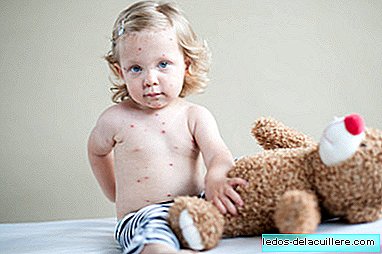
We were already reporting the 300% increase in measles cases worldwide in the first quarter of 2019, according to data provided by the World Health Organization (WHO).
Now, new data from Unicef explain the reason for these rebounds of the disease, in countries where it was already believed eradicated and also with high incomes: More than 20 million children worldwide have not received the measles vaccine in the past eight years.
Not all are poor countries
In low and middle income countries, the situation of lack of vaccination is very serious. In 2017, for example, in Nigeria the largest number of children under one year of age who did not receive the first dose was recorded, with almost 4 million. It was followed by India (2.9 million), Pakistan and Indonesia (1.2 million each) and Ethiopia (1.1 million).
But vaccination figures have also dropped significantly in high-income countries. The United States tops the list with 2.5 million children who did not receive the first dose of the vaccine between 2010 and 2017. In fact, right now it suffers from several measles outbreaks in various states and even in New York they have had to declare the state of emergency.
It is followed by France and the United Kingdom, with more than 600,000 and 500,000 unvaccinated infants, respectively, during the same period.
 In Babies and more Measles alert in Europe: 69 deaths in the last two years, the same as in the previous 17
In Babies and more Measles alert in Europe: 69 deaths in the last two years, the same as in the previous 17The ten high-income countries where children were not vaccinated with the first dose of measles vaccine between 2010 and 2017 (figures in thousands):
- United States: 2,593,000
- France: 608,000
- United Kingdom: 527,000
- Argentina: 438,000
- Italy: 435,000
- Japan: 374,000
- Canada: 287,000
- Germany 168,000
- Australia: 138,000
- Chile: 136,000
We need 95% vaccination

Two doses of the measles vaccine are essential to protect children from the disease. However, Unicef explains, "due to lack of access, poor health systems, complacency and fear or skepticism about vaccines", The global coverage of the first dose of measles vaccine was 85% in 2017, a figure that has remained relatively constant over the past decade despite population growth.
The global coverage of the second dose is much lower, 67%. And although the figures are better in the richest countries, they are not acceptable either: the coverage of the first dose is 94% while the second falls to 91%.
WHO recommends an immunization coverage threshold of 95% to achieve the so-called 'collective immunity'.
As explained by Henrietta Fore, Executive Director of Unicef:
“The breeding ground for global measles outbreaks that we witness today was established years ago. Measles virus will always find unvaccinated children. If we really want to prevent the spread of this dangerous but avoidable disease, we must vaccinate all children in both rich and poor countries. ”
In the first three months of 2019, more than 110,000 cases of measles were recorded worldwide, almost 300% more than in the same period last year. An estimated 110,000 people died from measles in 2017, mostly children, representing an increase of 22% over the previous year.
 In Babies and more, measles cases increase worldwide by 300 percent, WHO warns
In Babies and more, measles cases increase worldwide by 300 percent, WHO warnsA very dangerous and contagious disease
Unicef points out that measles is a very contagious disease, more than Ebola, tuberculosis or the flu:
The virus can contract until more than two hours after someone who has left a room.
It spreads through the air and infects the respiratory tract.
It can kill children with malnutrition or smaller babies, even without vaccinating.
Once contagion occurs, there is no specific treatment to combat measles, so Vaccination is a vital tool to save children.
 In Babies and more Measles vaccine: everything you need to know
In Babies and more Measles vaccine: everything you need to knowMeasles cases are rising to alarming levels. At the head of this increase are ten countries that account for more than 74% of the total increase, and several that were already free of measles.
Ukraine, the Philippines and Brazil have recorded the largest increases in measles cases from 2017 to 2018. In Ukraine alone, there were 35,120 cases in 2018; According to the government, another 24,042 people have been infected in the first two months of 2019. So far this year, the Philippines has accounted for 12,376 cases and 203 deaths *.
Worldwide, 98 countries recorded more measles cases in 2018 than during the previous year, which weakens the progress against this easily preventable, but potentially fatal disease.
 In Babies and more Anti-vaccine movements are the main cause of the measles outbreak in Europe, experts say
In Babies and more Anti-vaccine movements are the main cause of the measles outbreak in Europe, experts sayHenrietta Fore, executive director of this United Nations agency recalls that these figures are a wake-up call and that we have "A safe, effective and cheap vaccine against a very contagious disease".
"A vaccine that, during the last two decades, has saved almost a million lives a year. These cases have not appeared overnight. The serious outbreaks we see today emerged in 2018. If we do not act today, tomorrow we will see disastrous consequences on children ”.In Spain, according to data from the Advisory Committee on Vaccines of the Spanish Association of Pediatrics, vaccination coverage is excellent, especially in primary vaccination, standing above 97 percent.
The measles vaccine is funded by Social Security and is part of the triple viral next to rubella and mumps. In the vaccine calendar, it is established to administer a first dose between 12 and 15 months and a second booster dose between two and four years.
Little else remains to be said. Unfortunately, the figures speak for us: vaccinating against measles is the only way to protect all children against this dangerous disease. And so does Henrietta Fore, who concludes:
"It is essential not only to increase coverage, but also to maintain vaccination rates with adequate doses to create an immunity umbrella for everyone."
And in our hands is to achieve it.
Photos | iStock












